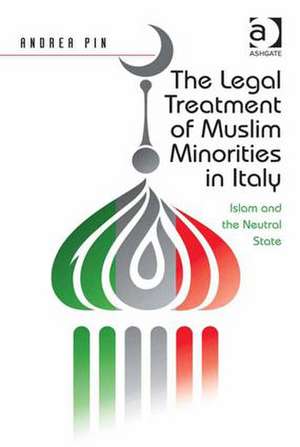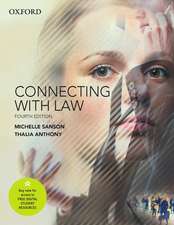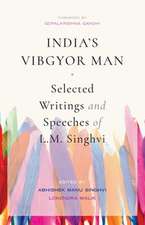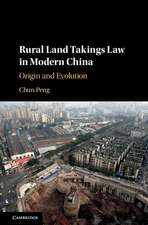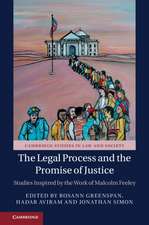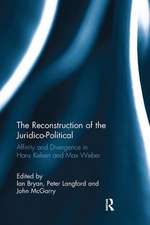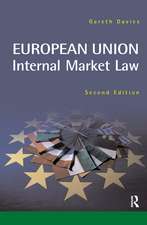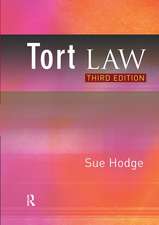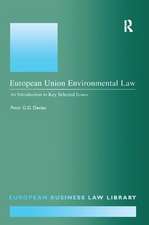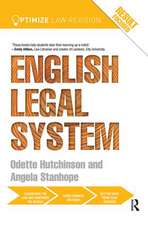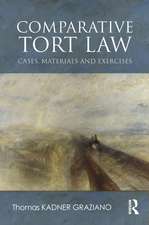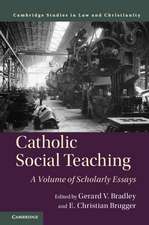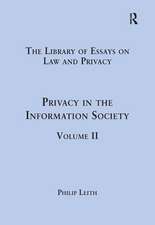The Legal Treatment of Muslim Minorities in Italy: Islam and the Neutral State
Autor Andrea Pinen Limba Engleză Hardback – 4 dec 2015
| Toate formatele și edițiile | Preț | Express |
|---|---|---|
| Paperback (1) | 258.06 lei 6-8 săpt. | |
| Taylor & Francis – 30 iun 2020 | 258.06 lei 6-8 săpt. | |
| Hardback (1) | 820.86 lei 6-8 săpt. | |
| Taylor & Francis – 4 dec 2015 | 820.86 lei 6-8 săpt. |
Preț: 820.86 lei
Preț vechi: 1141.00 lei
-28% Nou
Puncte Express: 1231
Preț estimativ în valută:
157.07€ • 163.99$ • 129.100£
157.07€ • 163.99$ • 129.100£
Carte tipărită la comandă
Livrare economică 04-18 aprilie
Preluare comenzi: 021 569.72.76
Specificații
ISBN-13: 9781472450234
ISBN-10: 147245023X
Pagini: 176
Dimensiuni: 156 x 234 mm
Greutate: 0.51 kg
Ediția:1
Editura: Taylor & Francis
Colecția Routledge
Locul publicării:Oxford, United Kingdom
ISBN-10: 147245023X
Pagini: 176
Dimensiuni: 156 x 234 mm
Greutate: 0.51 kg
Ediția:1
Editura: Taylor & Francis
Colecția Routledge
Locul publicării:Oxford, United Kingdom
Cuprins
Foreword, John Witte, Jr.; Introduction; Islam in Italy; The role of state-religion agreements in Italy: an imperfect pluralism; Islam and the state: tradition and modernization; Islam and relations with the Italian state; Making sense of religious freedom for Italian Muslims; The Italian version of state neutrality: ‘laicità’; State ‘laicità’ vis-à-vis the Muslim community’s demands; Conclusion: finding religious freedom in today’s ‘hybridization’; Index.
Notă biografică
Andrea Pin is Associate Professor of Comparative Public Law at the University of Padua. A Senior Fellow at the Center for the Study of Law and Religion at Emory University and a member of the scientific committee of Oasis International Foundation, he was visiting professor at the Universities of Emory and Notre Dame, visiting fellow at the Kellogg Institute for International Studies and clerk justice at the Italian Constitutional Court. He has authored three books and several legal journal articles and book chapters. His works have appeared in Italian, English, French and Spanish.
Recenzii
"Professor Pin has done yeoman service in bringing this revealing and promising story of Muslim religious culture and religious freedom in Italy to the attention of the English speaking world. His writing is deeply researched, refreshingly comparative, boldly proffered, and often wise beyond his youthful years. It is a privilege and pleasure to commend this important study." - John Witte, Jr., Emory University, USA
"Islam challenges both the secular and the Catholic tradition of Italy. This book designs a triangle, where the Italian Catholic background and secular legal system react to the Islamic presence through judicial accommodations and political negotiations fostering the contamination of models and identities. A key contribution to understand one of the most interesting patterns of integration in Europe." - Silvio Ferrari, University of Milan, Italy
"The countries of Europe have adapted in different ways to the collapse of their monolithic Christian inheritance and the rise of Muslim traditions, laws and practices. Professor Pin explores the extent to which Islam has become integrated into civil society and church-state relations in Italy. His study reveals the self-made difficulties which have arisen in consequence of insufficient attention being given to adapting existing structures, modelled on Vatican concordats, to the requirements of an unfamiliar faith which is neither fully accepted nor properly understood. This book is a thoughtful and profound analysis of the current dysfunctionality of Italy's governmental engagement with Islam, and a convincing plea for it to be revisited through a more honest, focussed and pragmatic dialogue." - Mark Hill QC, Cardiff University, UK
"Andrea Pinâ's book offers an encompassing account of the legal treatment of religious minorities in Italy. Interestingly enough, it shows that the Italian constitutional culture and its state-religion model look well equipped to address one of the biggest challenges of our times: the place of Islam in the West." - Marta Cartabia, Italian Constitutional Court
"Islam challenges both the secular and the Catholic tradition of Italy. This book designs a triangle, where the Italian Catholic background and secular legal system react to the Islamic presence through judicial accommodations and political negotiations fostering the contamination of models and identities. A key contribution to understand one of the most interesting patterns of integration in Europe." - Silvio Ferrari, University of Milan, Italy
"The countries of Europe have adapted in different ways to the collapse of their monolithic Christian inheritance and the rise of Muslim traditions, laws and practices. Professor Pin explores the extent to which Islam has become integrated into civil society and church-state relations in Italy. His study reveals the self-made difficulties which have arisen in consequence of insufficient attention being given to adapting existing structures, modelled on Vatican concordats, to the requirements of an unfamiliar faith which is neither fully accepted nor properly understood. This book is a thoughtful and profound analysis of the current dysfunctionality of Italy's governmental engagement with Islam, and a convincing plea for it to be revisited through a more honest, focussed and pragmatic dialogue." - Mark Hill QC, Cardiff University, UK
"Andrea Pinâ's book offers an encompassing account of the legal treatment of religious minorities in Italy. Interestingly enough, it shows that the Italian constitutional culture and its state-religion model look well equipped to address one of the biggest challenges of our times: the place of Islam in the West." - Marta Cartabia, Italian Constitutional Court
Descriere
This book describes the legal treatment of Muslims in Italy, contrasting it with other European states and jurisprudence and with wider global tendencies. The study presents a series of case studies and a theoretical framework built around the concepts of religious freedom, state neutrality and church and state collaboration. The author argues that this model, which combines the state level with the supranational level in the form of the European Convention of Human Rights, better accommodates religious freedom not just for Muslims, but for wider society, in Italy and elsewhere.
